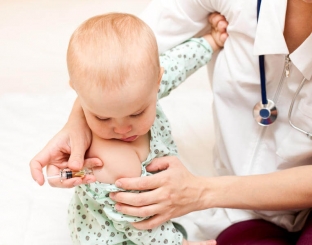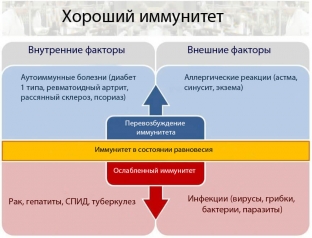The more often you get sick, the higher your immunity - some are sure. Others are convinced that ailments that follow one after another weaken the immune system. Who is right?
Susanna Kharit, MD, Head of the Department of Infectious Disease Prevention, Research Institute of Children's Infections, FMBA of Russia, answered some frequently asked questions about immunity.
Theoretically, any disease (especially a viral one) stimulates the immune system and strengthens it, and ultimately allows a person to resist allergies. On the other hand, if a child has a genetic predisposition to immune defects, any disease can cause serious complications that negatively affect the immune system.
Is it true that childhood diseases are more severe in adults?
Of course, the father will endure the same chickenpox much harder than his son. Adults, due to the maturity of the immune system, give an overreaction to any antigen - their illnesses occur with high fever and severe intoxication. But there is no guarantee that the child will suffer the disease easily - in one in 1000 children, measles, chickenpox, rubella cause encephalitis, and parotitis in 10-20% of children leads to meningitis. Therefore, it is better to protect a child, like an adult, from diseases.
They say that the healthiest and strongest people in childhood walked around with snot all the time?
Snot causes about 200 pathogens - it is impossible to get sick with all of them (and get immunity to them). Children often get sick for various reasons - both due to defects in immunity, and because of living conditions. In particular, if the house is smoked, the child's mucosa will be more sensitive to viruses and microbes, and he will catch a cold more often. In general, frequent illnesses weaken the body, and the weaker it is, the more difficult it is to endure each subsequent infection. If someone becomes healthy, it is due to the fact that with age they take on the mind - they begin to harden, play sports, eat right - and this gives a result.
It is believed that immunity matures up to a year. Is it true?
Children under one year of age are less likely to suffer from viral diseases, such as measles, as they are protected by antibodies - protective proteins produced by the mother. By 6-12 months, maternal antibodies disappear from the baby's blood, and he remains defenseless against the disease. And already at this age, vaccination is recommended.

Many parents believe that the risk of complications from vaccinations is many times greater than the risk of the disease itself...
A vaccine cannot be absolutely safe - it contains an active substance and therefore can cause unwanted reactions. Researchers have found that there is a genetic predisposition to post-vaccination complications. When it becomes possible to study the genome of each, it will be possible to identify children with genetic characteristics and vaccinate them according to a different scheme. While it is necessary to correlate the risk of illness with the risk of vaccination - serious complications from vaccination are extremely rare (1 case per million vaccinated), and people die much more often from infections and viruses. Doctors cynically say that the best advertisement for vaccines is death. As soon as the first deaths from diphtheria were recorded in the 1990s, there were queues outside the prevention rooms.
New vaccinations
For pneumococcal disease - reduces the incidence of pneumococcal meningitis by 90% and pneumonia in children by 70%.
Human papillomavirus - protects against cervical cancer.
Chickenpox – protects against chickenpox, especially relevant for women who are planning a pregnancy and have not had chickenpox before.
From respiratory syncytial virus (RSV) - the main cause of hospitalization of children under one year old and the main cause of death of premature babies due to underdevelopment of the lungs.

Source estet-portal.com






Add a comment